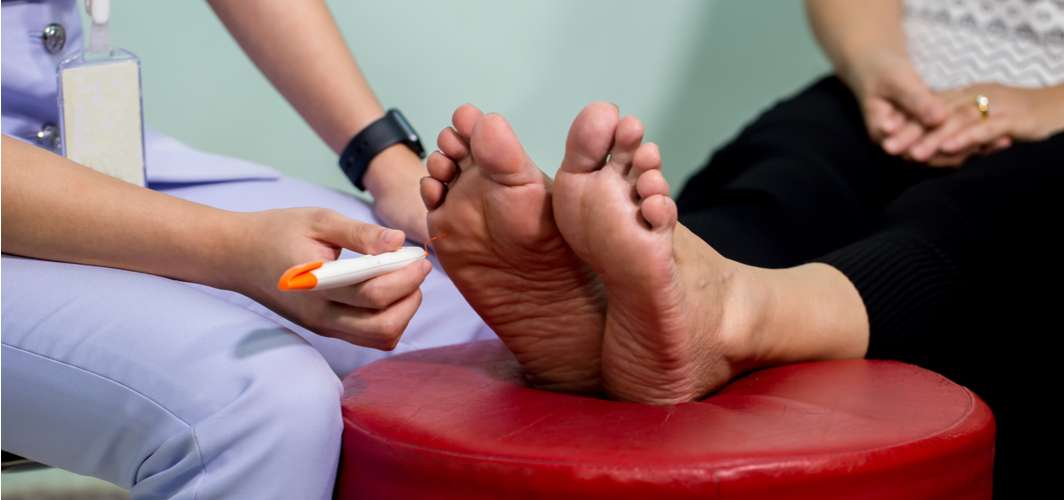Diabetes Management
Can Diabetes Affect Your Recovery?
2 min read
By Apollo 24|7, Published on - 30 January 2024, Updated on - 22 February 2024
Share this article
0
0 like

Diabetes, a chronic condition characterized by elevated blood sugar levels, can exert a significant impact on one's ability to recover from illnesses, injuries, or surgical procedures. In this blog, we'll delve into how diabetes alters the body's natural healing mechanisms, potentially causing delays in recovery: Wound Healing, increasing infection risks, and posing challenges during pain management.
Slower Healing:
One of the most notable ways diabetes can affect recovery is by slowing down the healing process. High blood sugar levels can impair blood circulation and damage small blood vessels, essential for carrying oxygen and nutrients to healing tissues. As a result, wounds, surgical incisions, or injuries may take longer to heal, increasing the risk of infections and complications.
Increased Risk of Infections:
When you're trying to recover, your body's ability to fight off bacteria and viruses is crucial. High blood sugar levels create an ideal environment for harmful pathogens to thrive, making infections a more significant concern during recovery.
Post-Surgery Complications:
For individuals with diabetes undergoing surgery, the risks are higher. Poorly managed blood sugar levels can lead to complications such as delayed wound healing, surgical site infections, and even cardiovascular issues during the operation. Surgeons often require tight glycemic control before, during, and after surgery to minimize these risks.
Delayed Pain Management:
High blood sugar (glucose) can injure nerves throughout the body. Depending on the affected nerves, diabetic neuropathy symptoms include pain and numbness in the legs, feet, and hands. Poorly controlled pain is a risk factor for hyperglycemia.
Chronic Conditions' Impact:
Diabetes is often associated with other chronic conditions, such as heart disease and kidney disease, which can complicate recovery from unrelated health issues. These comorbidities can limit your body's ability to respond to the stress of recovery and increase the overall recovery time.
Conclusion:
In conclusion, diabetes can significantly affect your recovery process by slowing healing, increasing the risk of infections, complicating surgical procedures, delaying pain management, and exacerbating the impact of other chronic conditions. For improved recovery outcomes, it's crucial to manage your diabetes effectively through proper blood sugar control, regular monitoring, and a healthy lifestyle.
Diabetes Management
Consult Top Diabetologists
View AllLeave Comment
Recommended for you

Diabetes Management
Diabetic Foot: Can it be Prevented?
The development of diabetic foot can be prevented through various measures. Effective prevention includes regular foot care, such as daily inspection and cleaning, wearing comfortable and proper-fitting shoes, managing blood sugar levels, controlling blood pressure and cholesterol, maintaining a healthy lifestyle, avoiding smoking and alcohol consumption, and seeking immediate medical attention for any foot issues.
.jpg?tr=q-80)
Diabetes Management
Managing Stress with Self-Care Strategies for Better Sugar Control
To manage diabetes, self-care practices like monitoring blood glucose levels, being active, practicing yoga for stress management, good sleep, and maintaining a balanced diet are crucial. It is important to receive counseling and understand diabetes self-care practices as they are crucial in improving outcomes.

Diabetes Management
Is Air Travel Safe During Diabetes? 7 Tips for a Comfortable Journey
Individuals with diabetes must be well-prepared before air travel. Consult your healthcare provider, pack essential supplies in your carry-on, ensure proper medication storage, carry diabetes-friendly snacks, stay hydrated, adjust meal timing if needed, and stay active during the flight. With careful planning and these crucial steps, you can travel confidently, knowing you're equipped to manage your diabetes effectively throughout the journey.
Subscribe
Sign up for our free Health Library Daily Newsletter
Get doctor-approved health tips, news, and more.
Visual Stories

8 Fruits That are Incredibly Healthy for Diabetes
Tap to continue exploring
Recommended for you

Diabetes Management
Diabetic Foot: Can it be Prevented?
The development of diabetic foot can be prevented through various measures. Effective prevention includes regular foot care, such as daily inspection and cleaning, wearing comfortable and proper-fitting shoes, managing blood sugar levels, controlling blood pressure and cholesterol, maintaining a healthy lifestyle, avoiding smoking and alcohol consumption, and seeking immediate medical attention for any foot issues.
.jpg?tr=q-80)
Diabetes Management
Managing Stress with Self-Care Strategies for Better Sugar Control
To manage diabetes, self-care practices like monitoring blood glucose levels, being active, practicing yoga for stress management, good sleep, and maintaining a balanced diet are crucial. It is important to receive counseling and understand diabetes self-care practices as they are crucial in improving outcomes.

Diabetes Management
Is Air Travel Safe During Diabetes? 7 Tips for a Comfortable Journey
Individuals with diabetes must be well-prepared before air travel. Consult your healthcare provider, pack essential supplies in your carry-on, ensure proper medication storage, carry diabetes-friendly snacks, stay hydrated, adjust meal timing if needed, and stay active during the flight. With careful planning and these crucial steps, you can travel confidently, knowing you're equipped to manage your diabetes effectively throughout the journey.


